Five essential stainless steel vessels for successful soap crafting include melting pots with variable speed motors, double boiler systems for precise temperature control, professional molds for clean edges, non-reactive measuring vessels for essential oils, and large storage containers for curing. These 304-grade stainless steel tools resist corrosion, won't react with lye, clean easily, and provide durability for repeated use. Discover how these vessels can transform your soap making from hobby to professional-quality production.
Choosing the Perfect Stainless Steel Melting Pot for Soap Base Preparation
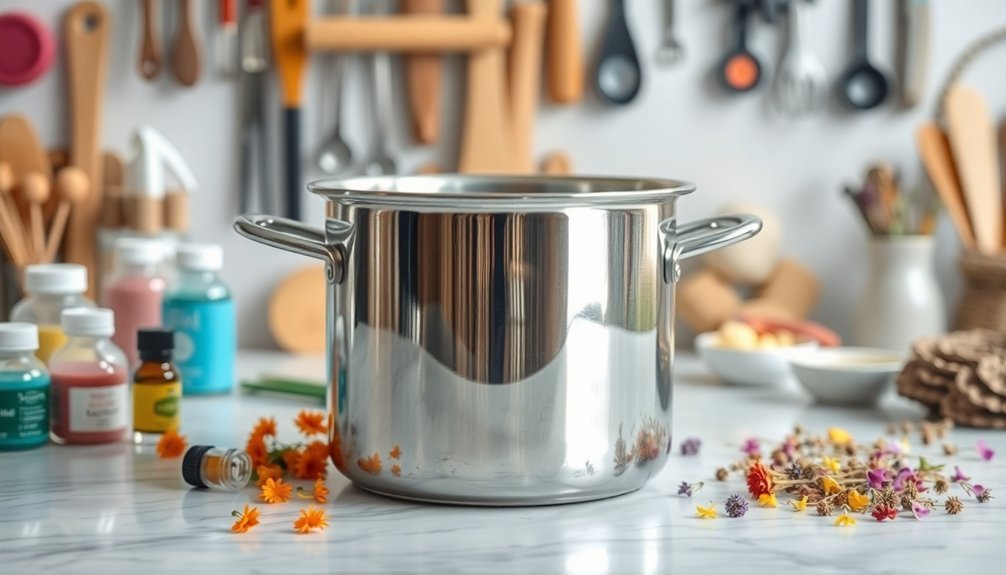
The three most critical factors when selecting a stainless steel melting pot for soap making are durability, non-reactivity, and heat distribution.
These vessels excel because they won't corrode or react with lye, ensuring your soap remains uncontaminated.
When shopping for your pot, consider your production scale—larger 98-liter pots suit commercial operations, while smaller vessels work for hobbyists. Professional soap makers benefit from tanks that feature variable speed motors that adjust between 180-700 RPM for optimal mixing results.
Look for models with convenient features like ball valves for controlled pouring and digital temperature controls for precision.
Don't overlook cleaning requirements; pots with rounded inner surfaces simplify this task.
Though initially more expensive than alternatives, stainless steel's longevity makes it cost-effective.
Many modern options offer energy-efficient heating systems and innovative tilt technologies that streamline your soap-making process.
Double Boiler Systems: The Secret to Temperature Control in Artisan Soap Making
While selecting the right melting pot forms your foundation for soap making, mastering temperature control truly elevates your craft to artisanal levels.
Double boilers provide this precision by using steam rather than direct heat, preventing burns and guaranteeing even melting of your soap or wax bases.
You'll find two practical options: invest in a professional stainless steel system with thermostatic controls, or create your own using a saucepan and heat-resistant bowl.
When making a DIY version, make certain the bowl fits securely while allowing steam to escape freely—this prevents dangerous pressure buildup.
For easier pouring, try placing a Pyrex measuring cup on a makeshift pedestal (like a tuna can) inside your water bath. Remember to reduce heat to a simmer after boiling to maintain ideal melting conditions without excessive steam.
Always handle hot vessels with oven mitts and maintain proper water levels to avoid scalding.
Stainless Steel Molds: Achieving Professional Edges and Easy Release
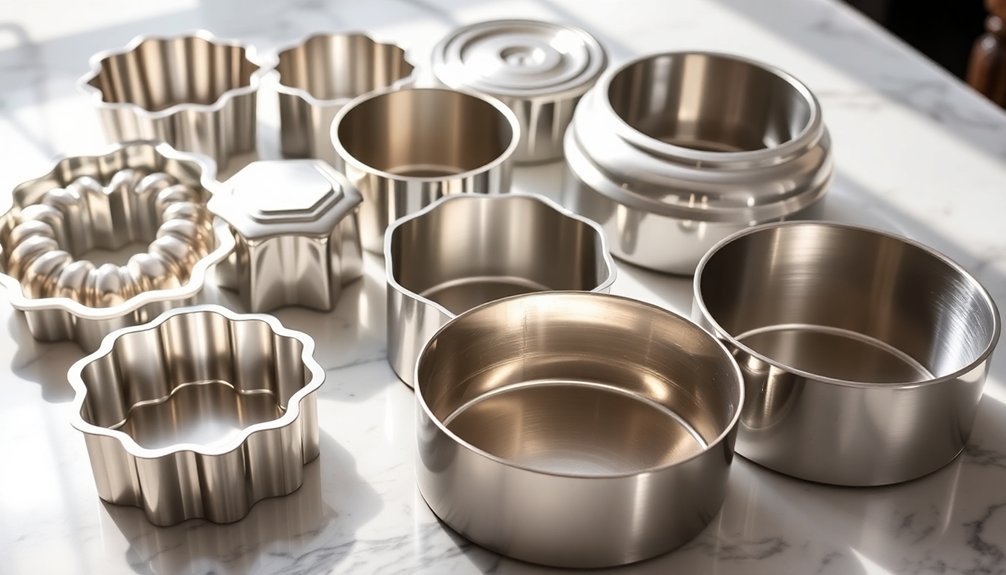
Among all metallic options for soap making, stainless steel molds stand alone as the only safe choice that won't react with caustic lye solutions. You'll appreciate the clean, sharp edges they produce, giving your soaps a professional appearance that other materials can't match. Unlike wooden molds, stainless steel doesn't require proper lining with freezer paper to prevent soap from sticking to the mold walls.
| Feature | Benefit |
|---|---|
| Non-reactive | Prevents dangerous hydrogen gas release |
| Durability | Withstands repeated use without warping |
| Easy cleaning | Sanitizes thoroughly between batches |
| Professional finish | Creates sharp, defined edges |
| Versatility | Works for both hot and cold process methods |
While you'll need to properly line these molds for easy release, the investment pays off in longevity. Though more expensive than plastic or silicone alternatives, stainless steel molds deliver superior results that justify their cost for serious soap makers.
Mixing and Measuring Vessels: Precision Tools for Essential Oil Incorporation
Precise measurement stands as the foundation of successful essential oil work, making quality stainless steel vessels indispensable in your crafting arsenal.
These non-reactive containers prevent unwanted aroma absorption while mixing your precious oils, ensuring the integrity of your blends remains intact.
You'll find stainless steel's versatility extends beyond mixing bowls to calibrated measuring cups and spoons that deliver consistent results every time.
For ultimate accuracy, pair these with digital scales and pipettes when working with potent essential oils where even a drop makes a difference. Unlike counting drops, weight measurements provide much greater precision for consistently replicable formulations.
The durability of stainless steel withstands repeated use and cleaning, making these tools cost-effective long-term investments.
Invest wisely in stainless steel—these enduring tools pay dividends through countless aromatic creations and cleanings.
When setting up your workspace, arrange these precision instruments ergonomically to enhance your workflow efficiency while crafting aromatic masterpieces.
Large-Capacity Stainless Steel Storage Containers for Curing and Aging
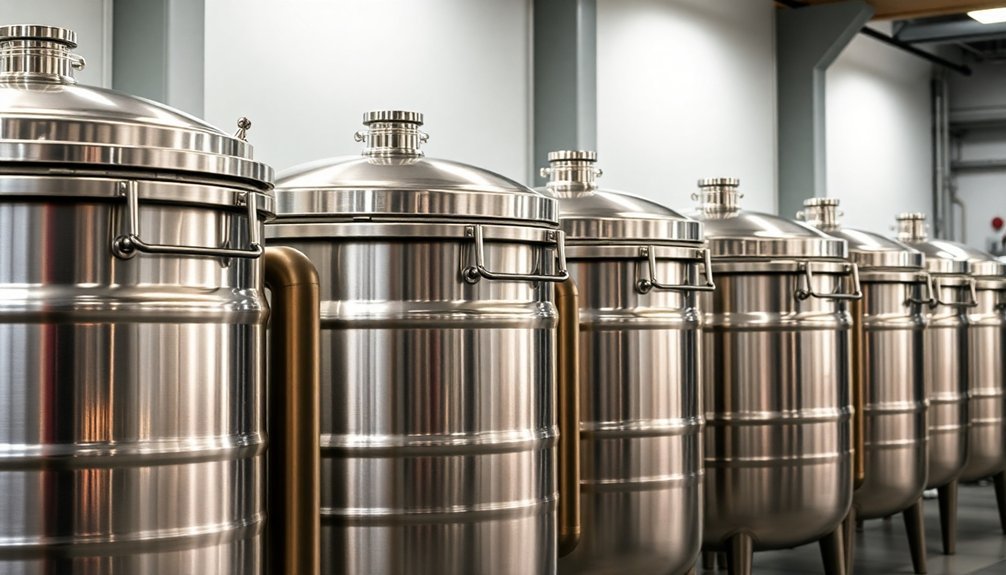
Large-capacity stainless steel storage containers represent the next level of vital oil crafting, allowing you to scale up your production from small batches to substantial quantities.
These durable vessels, typically made from 304-grade stainless steel, offer the perfect environment for curing and aging your formulations.
You'll appreciate their practical design features—reinforced edges, sanitary welds, and convenient transportation handles.
While they're substantial investments (often weighing around 375 pounds), their value comes from versatility and longevity.
Many craftspeople opt for custom manufacturing to meet specific requirements. With a typical minimum order of 20 pieces, these vessels are designed for serious production operations.
The food-grade stainless construction guarantees easy sanitization, essential for maintaining product purity during extended aging processes.
With airtight lid options available, you'll maintain freshness while your creations develop their full aromatic potential—all in USDA-compliant vessels designed for professional results.
Frequently Asked Questions
How Do I Remove Stubborn Soap Residue From Stainless Steel Vessels?
You can remove stubborn soap residue with vinegar solution or baking soda paste. Scrub gently with a non-abrasive sponge in the direction of the grain, then rinse thoroughly and dry completely.
Can Stainless Steel Vessels Affect Fragrance Retention in Essential Oils?
Yes, stainless steel actually improves fragrance retention in essential oils. You'll find it doesn't react with oils, maintains their purity, and prevents light degradation—all factors that help preserve your oils' natural fragrances.
What Grade of Stainless Steel Is Safest for Cosmetic Production?
For cosmetic production, you'll find 316L grade stainless steel is safest due to its superior corrosion resistance against chemicals, minimal leaching, and compliance with hygiene standards. It's worth the investment for quality products.
How Often Should I Replace My Stainless Steel Soap Making Tools?
You don't need to replace quality stainless steel soap making tools often. They'll last years with proper care, but replace them when you notice corrosion, performance decline, or damage that affects sanitation or safety.
Are Vintage Stainless Steel Vessels Suitable for Professional Soap Making?
Yes, vintage stainless steel vessels are suitable for professional soap making. They're durable, non-reactive with lye, and cost-effective long-term. Just make certain they're thoroughly cleaned and free from damage before you use them.
In Summary
You'll find that investing in these five essential stainless steel vessels transforms your artisan soap making process. They'll elevate your craft beyond the basics, ensuring consistent quality and professional results. Whether you're measuring precise amounts of essential oils or achieving perfect temperature control, these durable tools aren't just purchases—they're investments in your creative success. Make the upgrade and watch your soap making skills flourish.
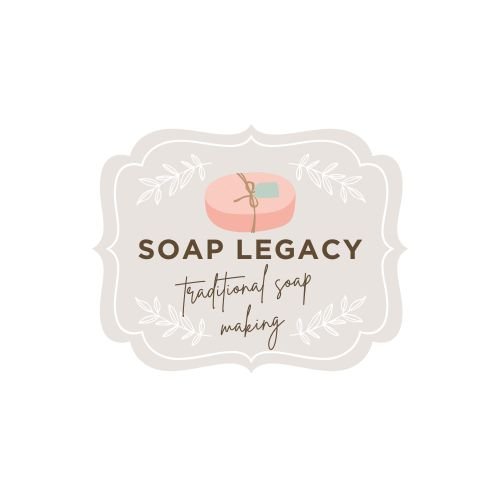
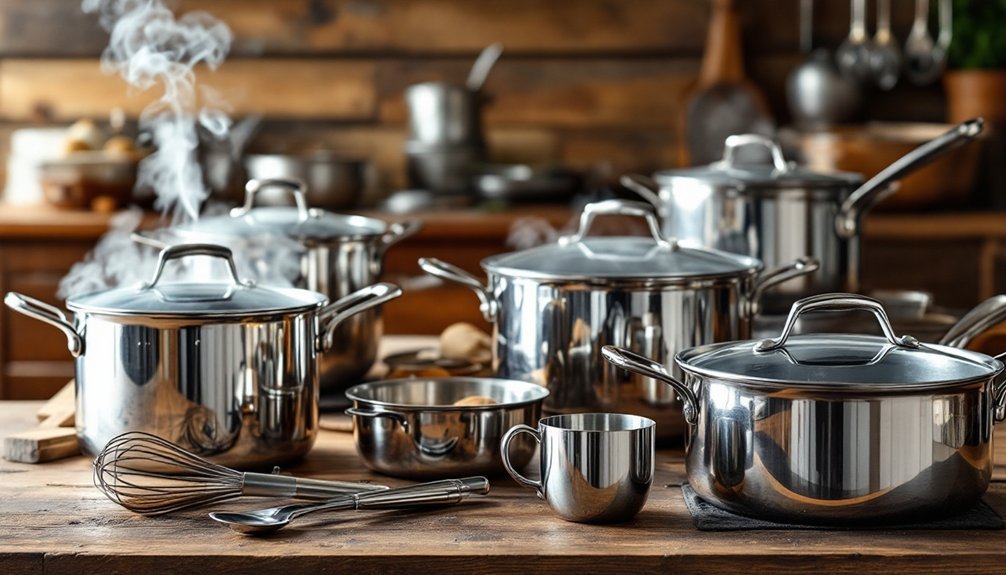
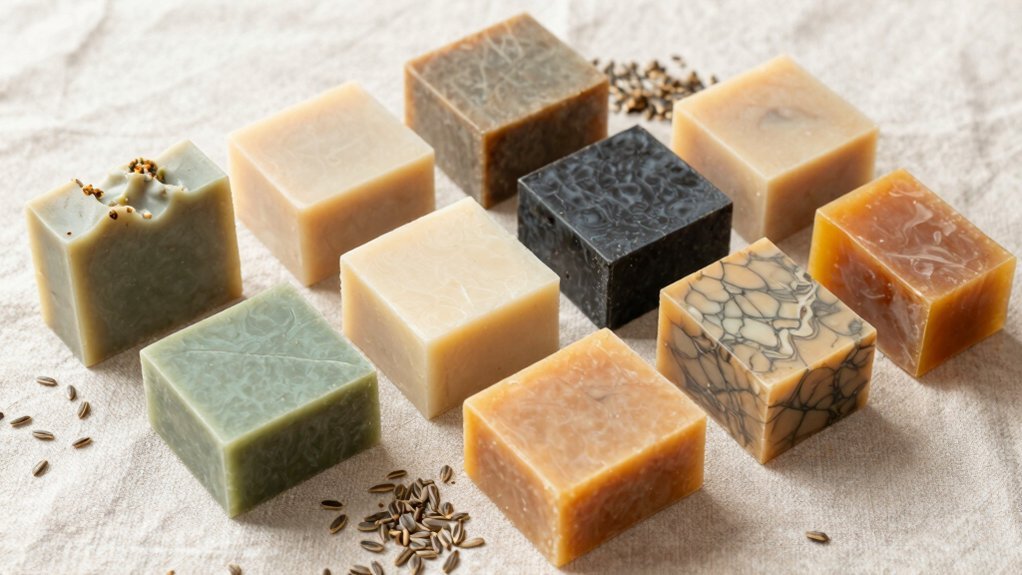
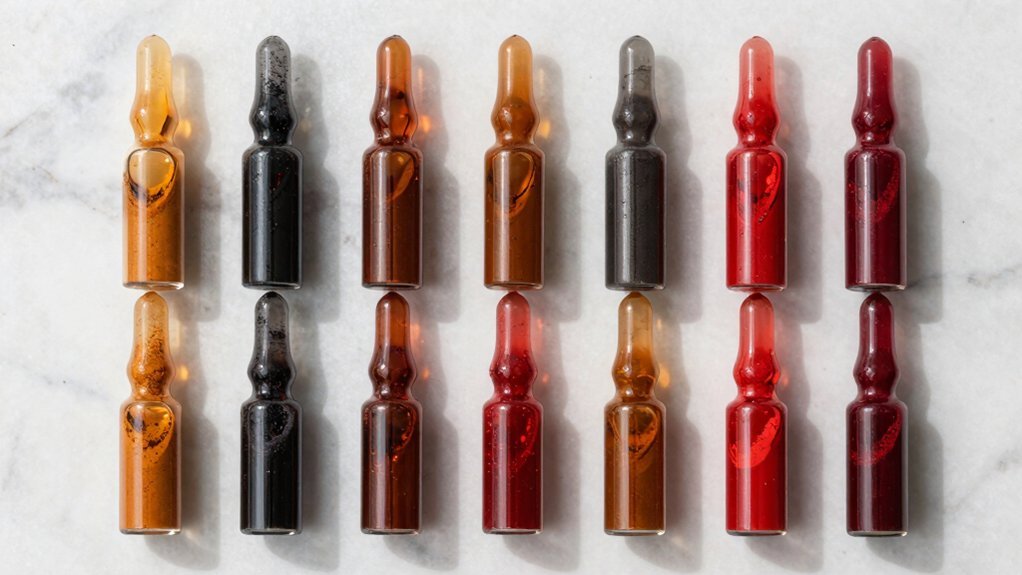
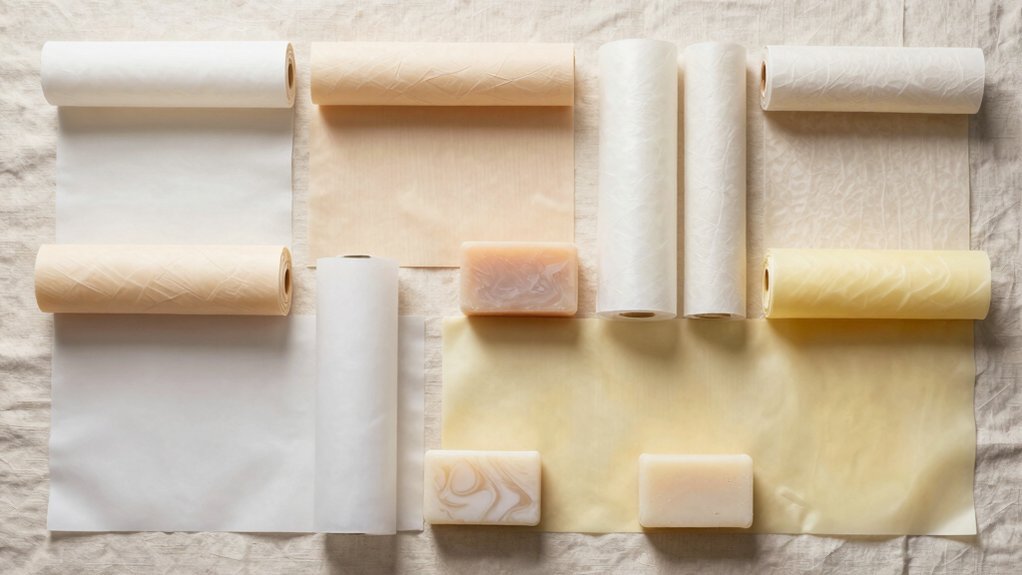
Leave a Reply